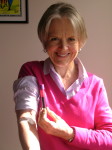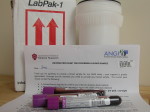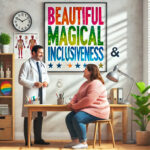Donating blood to find a cure for Anorexia Nervosa – makes my life count
Donating blood to find a cure for Anorexia Nervosa – makes my life count

Giving a blood sample to help find a cure for Anorexia Nervosa is one of the most meaningful moments in my life.
It’s positively heartwarming to watch how motivated people with histories of anorexia are to contribute to this study and help us crack the code of this devastating disorder. So many people are saying they will do anything to help prevent others from going through the living hell that anorexia put them through. We are so grateful for each and every volunteer.
_ ANGI principal investigator, Professor Cynthia Bulik (University of North Carolina, Chapel Hill)
I rolled up my sleeve and donated a blood sample for gene research and discovery today. My blood sample, along with many others, is being collected as part of the Anorexia Nervosa Genetics Initiative, a global effort to identify genes that contribute to eating disorders. Right now the blood sample is traveling by courier, 1700 kms from my home, to the Queensland Institute of Medical Research (QIMR) in Brisbane. To know that I am contributing in a small way to helping researchers find a cure for Anorexia Nervosa feels good. Really, really good.
The opportunity to contribute to science and help find a cure for the illness that tormented and almost took my life is indescribable, emotionally-overwhelming. A half century after I developed Anorexia Nervosa, I have given a blood sample to help find out why.
I have cried tears in my soul today. Tears for my parents who are not alive to know about this research. Tears especially for my mother,

When you are accepted as a volunteer, you will receive a pack like this. It feels great to be able to send the blood sample off to the researchers to help find a cure for Anorexia Nervosa.
because she did not understand what happened to her younger daughter, me, at age 11. She did not understand that I had an illness in my brain. She certainly did not know that part of the reason was genetic. She did not know how to help me. She did not know the real me was suppressed by this illness; she did not know that the little girl she knew but had disappeared was imprisoned deep inside, crying and trying to get out. So difficult, without a guide to help her, or me. As the years rolled by, misunderstandings became mountains that could not be crossed. I became alienated from my mother and father and my sister. Anorexia Nervosa affects the sufferer most but affects, in some way, every member of the family.
It affected my marriage, too. When I walked down the aisle at age 20 to marry George, my childhood sweetheart, Anorexia Nervosa went with me. I could not shake it off. It was worse than a monkey on my back. It was a black octopus in my brain. Eventually it destroyed my marriage.
My love of writing and love for my children, helped me survive, and eventually, in my 30s, I began to meet health professionals who understood the illness and set me on the long road to recovery. I had felt lost in a dark forest for decades; now I was receiving help to find a way out – and regain me. At age 55, I gained my freedom from Anorexia Nervosa and began writing books to help others who, through no fault of their own, were suffering this illness. Helping others has been the best way to make my life, and my suffering and loss, count.

With Professor Nick Martin and Professor Cynthia Bulik at the ANGI launch in Brisbane. The call is out for 1200 volunteers across Australia.
I was excited and honoured to be invited to help chief investigator Professor Cynthia Bulik, together with Professor Tracey Wade and Professor Nick Martin, launch the ANGI research program for Australia in Brisbane in May this year. Response to news about the research was amazing and swift, with more than 800 Australians offering to roll up their sleeves and donate blood for research. Click here.
If you have volunteered to participate in this research and are wondering when you will receive a response, the answer is ‘soon’.
ANGI project coordinator in Brisbane, Richard Parker, reports:
We have just started sending out the first mail wave of blood collection kits, so not everyone eligible for the next stage has been contacted yet. This will take many months as we have about 800 kits to organise and manage.
We haven’t contacted everyone who is yet to receive a blood kit but all eligible respondents will be contacted in due time over the next month. Meanwhile, all attempts to get new recruits on board are most welcome.
Make your experience count
If you have not yet signed up for ANGI yet but, like me, have experienced Anorexia Nervosa and would like to make your experience count in finding a cure, click right here. We can do it!





